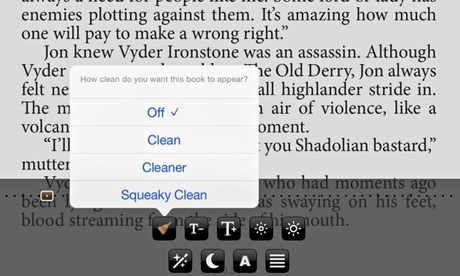
Do you like your books as they come, clean, or squeaky clean? Because there’s now an app that will let you state your preference, remove profanities from the text of your ebook, and replace them with “clean” alternatives.
Clean Reader – “the only e-reader that gives you the power to hide swear words” – sells more than a million ebooks from its online book store. Its app allows users to search the text, and “put a non-transparent ‘highlight’” over anything potentially offensive. The blanked-out word is replaced, when it is tapped, with one judged suitably safe. So in a passage from its online demonstration – “‘Don’t tempt me, you little bastard,’ growled Vyder” – bastard becomes jerk. In a slice of a David Baldacci novel, “Pick up your damn game, Bobby”, becomes “Pick up your darn game, Bobby”.
Why? They explain: “If there are books you’ve put off reading because you’ve heard they’re full of curse words, chosen to stop reading some books because you weren’t comfortable with the bad language in them, or if you worry about what’s in the books your children read … then Clean Reader is for you!”
Ron Charles of the Washington Post found out more. The app is the brainchild of a mother and father from Idaho, Jared and Kirsten Maughan, who were concerned when their daughter began reading library books with “pretty significant swear words”. They couldn’t find an app that would help them remove the offensive words, so they worked with the Chicago firm Page Foundry to create a “profanity-filtering” programme.
“We used several sites to generate our initial database of swear words/phrases,” Jared Maughan says by email. “Since then we’ve had help from a network of readers who send us words we’ve missed. As to which words go in which setting (clean, cleaner or squeaky clean), it’s basically a judgement call on our part. The replacement words can actually be fairly difficult. We have to consider how each swear word/phrase is most commonly used and then what the most appropriate alternate word would be to preserve context. Obviously the app doesn’t always get it right. There are times when the alternate word was chosen with the assumption the profane word was going to be used as a verb and in a particular instance it was used as a noun. But the vast majority of the time the alternate word is either not needed or is a good fit to preserve the general context.”
Maughan says the app is going well so far, with the “velocity of downloads … definitely increasing”; there have been downloads in more than 90 countries now.
“The original idea came from a conversation with our daughter. So we had young readers in mind when we first started,” he adds. “But as we told others what we were working on, we discovered there were a lot of adults who would rather not see profanity in the books they read. Books are kind of an interesting form of media. There’s no rating system for them. So when you browse through a bookstore you typically have no idea how ‘clean’ a particular book may or may not be unless you’ve heard about it from others who have read it first. So people like Clean Reader because it gives them an option to not see certain words in the books they’ve purchased if they end up being not as ‘clean’ as they’d hoped.”
And if an author is concerned about their work being changed? That’s not the reader’s problem, according to a recent blog on the Clean Reader site. “Will some authors be offended that some of their consumers use Clean Reader to pick out most of the profanity in their books? Perhaps. Should the reader feel bad about it? Nope. They’ve paid good money for the book, they can consume it how they want.”
At any rate, it’s winning good reviews. “Great app! I’m glad I don’t have to read all the profanity anymore! Great idea!” wrote one user. Another went so far as to say it had “brought me back to reading and loving books again”, adding: “Best app ever!”
Not everyone is convinced, however. “Edits inappropriately, doesn’t understand context. [Removes] words that have multiple uses and aren’t necessarily curse words, destroying context in written works. Worthless,” wrote a third user.
Unfortunately for profanity-averse readers, no such mechanism yet exists for the physical book, other than shutting your eyes and shouting “lalala” as loudly as you can, every time you get to a word beginning “fu-” or “cu-”. Now I’m off to see what happens to Trainspotting, once Clean Reader cleans up Irvine Welsh’s filthy act.

